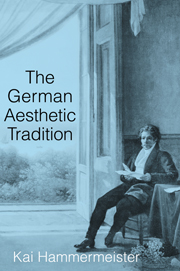7 - Kierkegaard, Nietzsche
Published online by Cambridge University Press: 14 January 2010
Summary
Kierkegaard
Aesthetic thought is central to Søren Kierkegaard's (1813–1855) philosophy, yet hardly another thinker – with the possible exception of the early Emmanuel Levinas – regards aesthetics with such disdain. Whereas idealist philosophy had granted art and beauty a privileged position in its various systems, Kierkegaard's reaction against idealism at large also affects his valuation of the aesthetic sphere. Intentionally, he reaches past the idealists in his attempt to redefine aesthetics as a sphere of life and inquiry; but unintentionally, he falls beneath the level of discussion that aesthetics had achieved during the previous decades. Kierkegaard opposes the idealist systems, especially the one advanced by Hegel, since for him their intellectual efforts remain irrelevant to quotidian life. The categories of being and becoming, so prominent in Hegel's Logic, have to be replaced in Kierkegaard's view by that of existence. Ontology, logic, and metaphysics are all given an anthropological spin by Kierkegaard. Many areas of philosophical inquiry are left altogether untouched by him – there is no philosophy of nature, hardly an ontology, little in terms of a philosophy of history, barely any political philosophy, in short, nothing resembling a philosophical system. Instead, Kierkegaard's thinking centers around the notion of existence that for him denotes the act of living considered as a unity of thought and feeling (both emotionally and sensually), desire and action. Yet this unity not only is not given as a preexisting mode of being for man; it is perpetually in a most precarious balance.
- Type
- Chapter
- Information
- The German Aesthetic Tradition , pp. 128 - 150Publisher: Cambridge University PressPrint publication year: 2002

